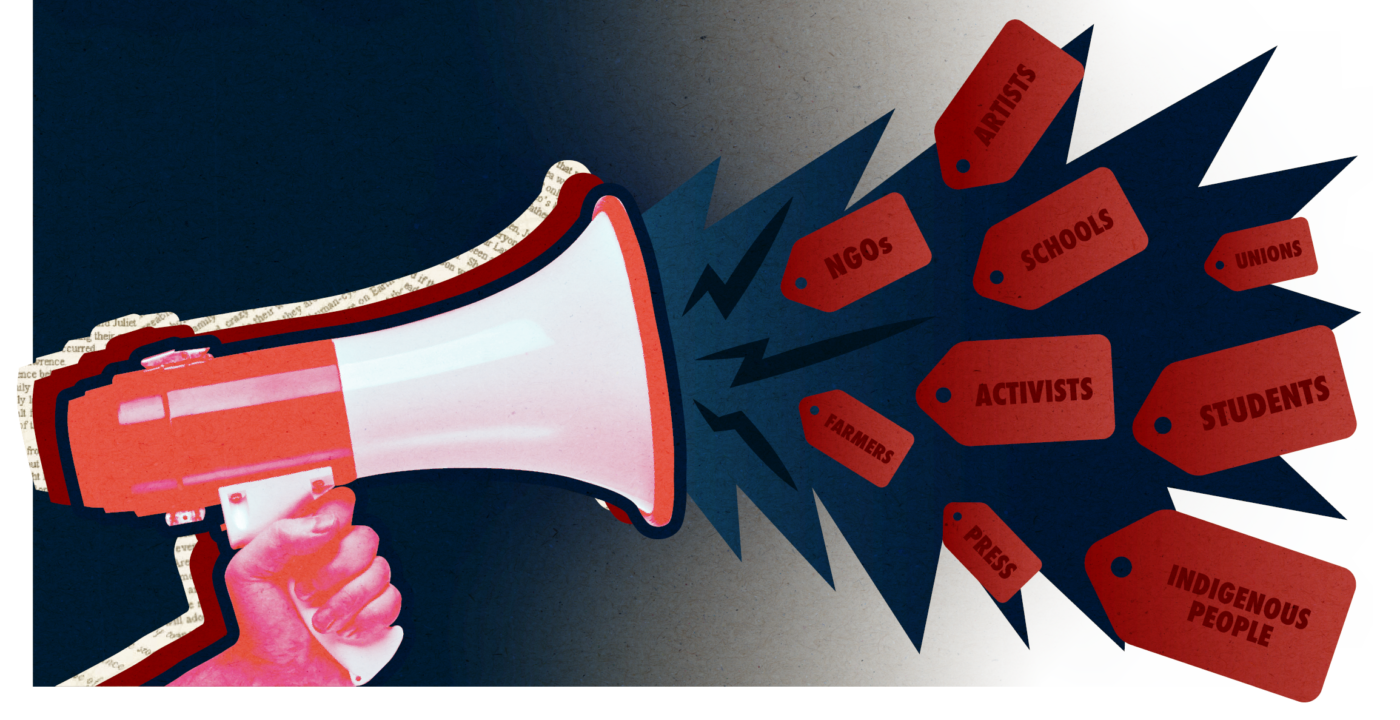THE THREAT of communism continues to be accentuated by various government officials. Relentless anti-left clamor has taken hold of government statements, mass media, and social dialogue—allowing officials and ordinary citizens alike to hurl accusations of ties to communist groups. This sets a dangerous tone for critics of the administration as they become more vulnerable to red-tagging.
While outspoken supporters of the administration invoke their right to free speech when questioned about red-tagging remarks, the act is perceived as a threat nonetheless. The resulting political climate may not only jeopardize dissenting voices, it may also shape the path of political dialogue and opposition in the country. This re-emphasizes the importance of government and media responsibility in public discourse.
Reverberating noise
News outlets, as well as public officials, are highly influential actors in shifting public perspective. Consequently, the messages and rhetoric that they respectively convey are likely to fuse into national consciousness. The manner and frequency of recurring messages, as explained by University of the Philippines Journalism Professor Danilo Arao, can give “an impression of the truth” to audiences.
Arao also noted confirmation bias—the disposition of people to favor information that reaffirms their beliefs—as one of the factors that influence the impact of disinformation. This coincides with cognitive dissonance, wherein people resist ideas that challenge their beliefs. Arao added that, on top of these, the delivery of fake news creates the “recipe for widespread dissemination.”
To push the diffusion further, social media comments and statements that tie activists to terrorists and rebels have now become common vessels of disinformation. Such anti-left narratives allow public attention to shift towards one supposed national enemy: Individuals associated with the political left.
Moreover, the perceived legitimacy of the government’s social media pages support the clamor of anti-left narratives when these accounts assist in reframing accusations as verified truths. Communication Professor Joanna Arriola emphasized that, under the Duterte administration, this coordinated behavior can be linked to the president’s populist approach.
“They are [very] confident about their ability to get the buy in or, at the very least, the silence of the majority,” Arriola said. This aggressive approach, along with recurring statements and disinformation echoing in spaces of discourse, subsequently heightens red-tagging and widens the divide among sectors.
Constricting spaces
Arriola noted that the framing of anti-left narratives and its consequences have mostly been tolerated by the administration as these work in their favor.
“It establishes boundaries between themselves and those who oppose them in whatever [way], those who are critical, those who dissent. That’s the ‘us versus them’ narrative,” she said.
The “us versus them” narrative simplifies labeling between critics and supporters and makes it easier for officials to apply anti-left narratives across voices of dissent. Political Science Professor Carmel Abao pointed out that anti-left rhetoric is used to suppress critical thinking and dissent, including non-left affiliated opposition.
This rhetoric is seen in how opposition congressmen and activists have been tied to communist groups by officials such as Lt. Gen. Antonio Parlade Jr. and Presidential Communications and Operations Office Undersecretary Lorraine Badoy. Even non-partisan sectors, such as the media and advocacy groups, have been caught in the crossfire.
For Abao, anti-left sentiments reinforce the lack of ideological discourse in the country and the prevalence of personality-based politics. “We are all affected by this because without any opposition force, there will be no checks on [the] government,” she said. “[What] this means is that the space for institutions and civil society to influence policy and governance becomes constricted.”
Keen eye
The shrinking domain of opposition indicates that democratic spaces continue to be shaped by political dialogues within the country. As red-tagging and anti-left narratives are echoed, truthful discourse and Filipino lives remain threatened. For Arao, false narratives and peddlers of such rhetoric will continue to shape public opinion for as long as media organizations give them airtime and unwittingly amplify these messages.
“The future of public communication rests on giving relevant media literacy,” Arao said, adding that audiences must learn the value of asserting a free media and demanding “responsible gatekeeping” on behalf of social media platforms.
Moving forward, the need to regulate false narratives given the political climate set by the current administration appears to be crucial now more than ever in the defense of truths. With the media and the government working towards creating responsible spaces for discourse, battling disinformation and overcoming hostility with spaces for dialogue will be possible.




